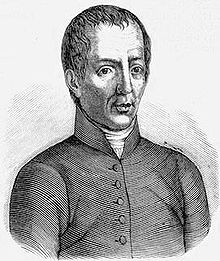György Pray
György (Georg) Pray (born September 11, 1723 in Neuhäusel , Hungary , † September 23, 1801 in Pest ) was a Hungarian historian and Jesuit .
Life
Pray comes from a Tyrolean noble family. After briefly studying law and philosophy, he joined the Jesuit order in Vienna in 1740. After spending two years in Vienna, he taught poetry and moral theology at religious colleges in Fünfkirchen , Großwardein , Rosenau , Trencsin , Tyrnau (1749) and Raab . Consecrated in 1754, he came to the Theresianum in Vienna in 1759 and also worked as an educator in Prince Salm's house. In Vienna, Pray met the historian Erasmus Fröhlich , who aroused his interest in Hungarian history. From then on, Pray devoted himself entirely to the medieval history of Hungary. Maria Theresa granted him a pension after the abolition of the Jesuit order in 1773 and appointed him "Historiographer of the Kingdom of Hungary ". Pray published one of the first Hungarian language monuments, the Pray Codex named after him . In pamphlets he defended the Finnish-Ugric origin theory of the Hungarians. When the University of Tyrnau was relocated to Ofen and later to Pest in 1777 , Pray was appointed curator of the university library. In gratitude for his services to the historical justification of the imperial claims on the Ottoman- occupied border provinces of the Habsburg Empire, he was appointed canon of Großwardein and abbot of Tornova.
Work (selection)
- Annales veteres Hunnorum, Avarum et Hungarorum from Anno a. CN 210 ad Annum C. 997. deducti, Partes tres (Vindobonae 1761, fol.)
- Annales Regum Hungariae from Anno Christi 997 usque ad Annum 1564 deducti, Partes V (Vindobonae, 1764–1770, fol.)
- Index rariorum Librorum Bibliothecae Universitatis Regiae Budensis. (Budae 1780–1781)
- Historia Regum Hungariae (Budae 1801)
literature
- Constantin von Wurzbach : Pray, Georg . In: Biographisches Lexikon des Kaiserthums Oesterreich . 23rd part. Kaiserlich-Königliche Hof- und Staatsdruckerei, Vienna 1872, pp. 224–229 ( digitized version ).
- George Pray , in: Catholic Encyclopedia. 1913 (English)
- Jószef Nagy: Pray, György . In: Biographical Lexicon on the History of Southeast Europe . Volume 3. Munich 1979, p. 475 f.
| personal data | |
|---|---|
| SURNAME | Pray, György |
| ALTERNATIVE NAMES | Pray, Georg |
| BRIEF DESCRIPTION | Hungarian historian |
| DATE OF BIRTH | September 11, 1723 |
| PLACE OF BIRTH | Neuhäusel |
| DATE OF DEATH | September 23, 1801 |
| Place of death | pest |
